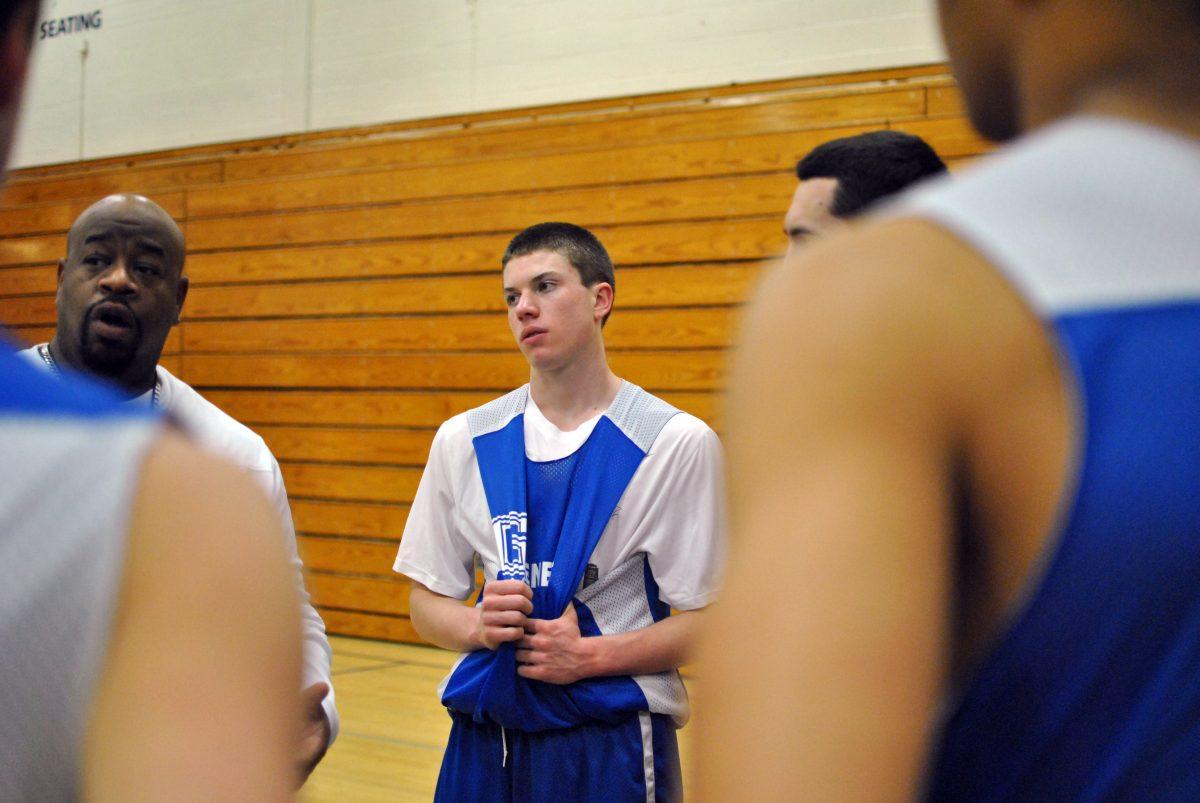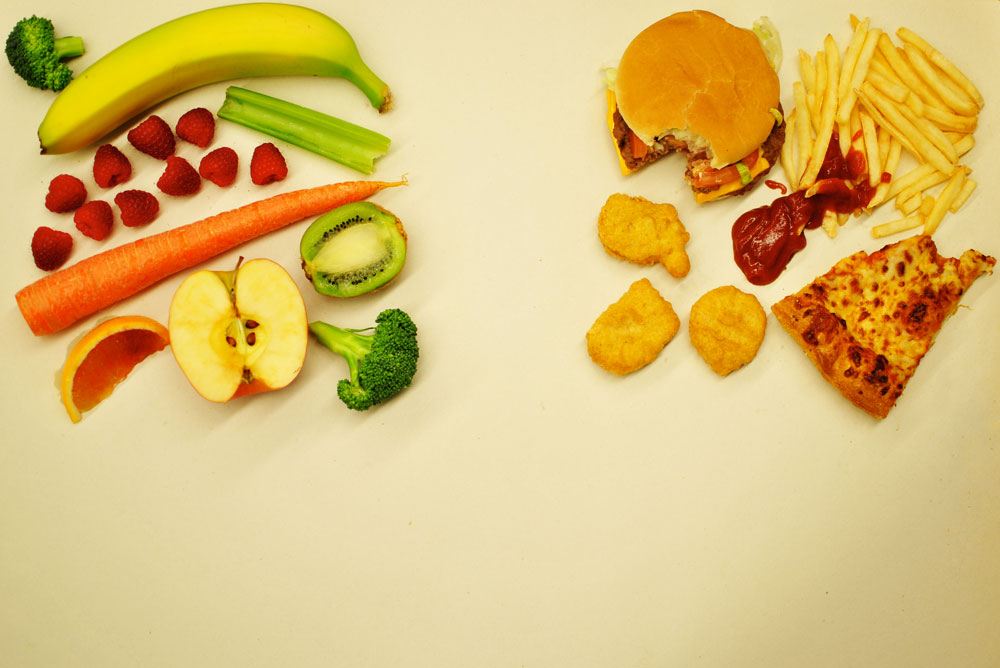On a sunny afternoon this past fall, Grant High School English teacher Therese Cooper’s “Words of Warfare” class proceeds as usual. Her students take notes on her presentation, discuss vocabulary words and get instructions on their newest homework assignment.
After 28 years of teaching, Cooper has seen and taught it all. But today is not a normal day. As her students begin to pack their bags awaiting the signal of the bell, she asks for their attention. “There is something I need to tell you. This is really important,” she says.
She waits an extra moment for the class to quiet down. “I have breast cancer,” she says matter-of-factly. “Unfortunately, I’m going to have to go through chemotherapy. Those of you who know me know that I’m at school every day and always here; it’s going to require that I’m gone, and I’m also going to lose my hair.”
She encouraged her class to attend the Grant football game that afternoon, which was going to be a “pink-out” in honor of Breast Cancer Awareness Month.
Cooper has been teaching English at Grant for 16 years. A leader within the English department and a Portland native, she is respected by her students for her organized, engaging teaching style and strong character.
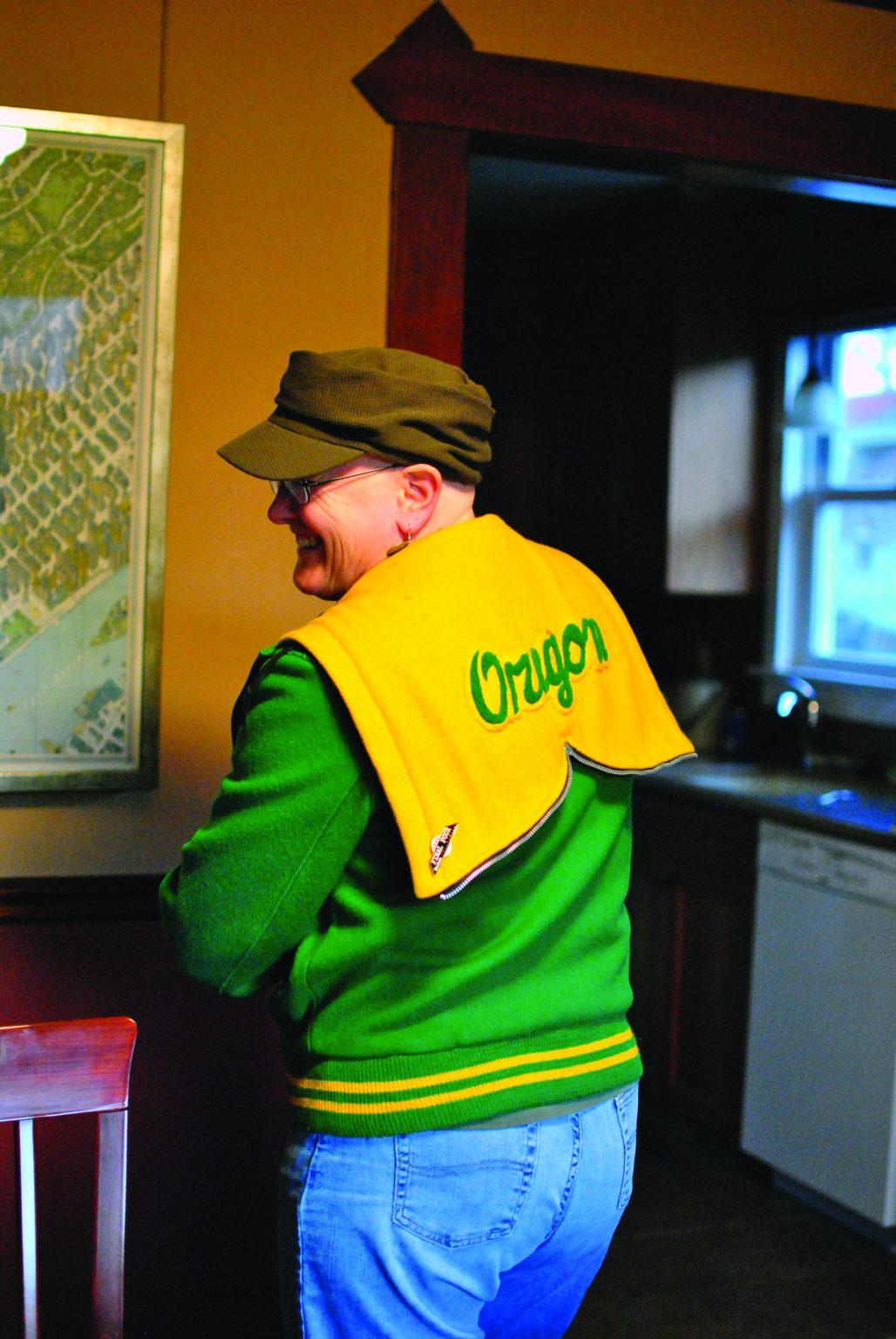
Diagnosed with Stage II breast cancer last August, Cooper has gone through one surgery and chemotherapy treatments, all while keeping up with her teaching. Even with her difficult diagnosis, Cooper is determined to not act like some sort of victim. “She doesn’t focus on the adversity of things,” says her husband, Jefferson Ranck. “She focuses on how to overcome them.”
Cooper describes the week of her diagnosis as awful. She went to the doctor after discovering a lump. She remembers getting “that feeling in your stomach when you’re nervous about something because you don’t have control, and you have a fear of what it will mean.”
Within three days of her initial doctor’s visit, she had been diagnosed with Stage II breast cancer, meaning it had spread to her lymph nodes.
Cooper had different options for her treatment, including a double or partial mastectomy. But since she has no history of breast cancer in her family, she chose to go with the intensive chemotherapy, which pumps toxins into your body to help kill the cancerous cells. For her, it wasn’t a difficult choice. “I want to get that crap out of my body, I don’t care,” she says.
She tries to keep a positive outlook on her treatment. “I can get through this,” she says. “It’s not the end of the world and it’s not going to kill me.”
An initial surgery in late August removed Cooper’s cancerous growth. At first, it was difficult for her to talk to people about her cancer, but she knew she couldn’t avoid the topic forever. “Soon, I’m going to start chemo and that means I’m not going to have any hair, and people are going to know something’s up,” she recalls thinking.
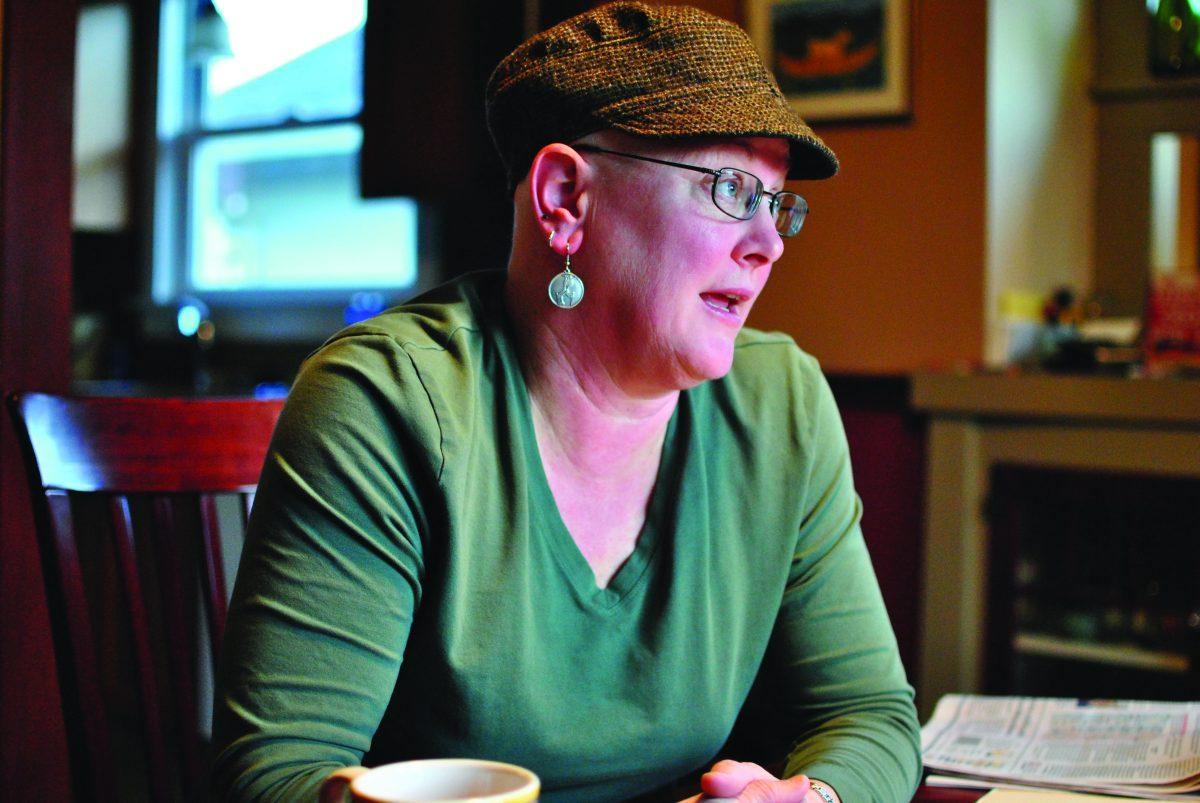
After she told her classes about her cancer, many students approached her to express their thoughts and concerns. “I think everybody is afraid of it,” she says now, “as they should be.”
According to the National Cancer Institute, of the approximately 2.6 million women currently alive in the United States who have had breast cancer, almost 95 percent of those cases occurred in women over 40. Women living in the United States today have a one in eight chance of being diagnosed with breast cancer.
Since the 1970s, the American Cancer Society has awarded more than $450 million in breast cancer research grants. Cooper herself is taking part in a research trial that tests a chemotherapy patient’s cognitive abilities. “If there’s something I can do to help others in the future, I think it’s my contribution that I can give,” she says.
Cooper has mixed feelings about the reactions she gets when people find out she has cancer. Some people’s eyes immediately look to her chest, while others try and “fix you” with advice. “It’s just like, ‘I’m fine. I can deal with this myself,’” she says.
Before she started treatment, Cooper’s oncologist took her to see the chemotherapy ward. “That really freaked me out,” she says. She remembers watching the ghostly faces of the people getting treatment. “There was one woman in particular who was just lying there all huddled up and she had this gray face,” Cooper recalls. “And I thought ‘Oh my god she is just really sick…my god this is going to be me.’”
A native of southwest Portland, Cooper attended Jackson High School (now Jackson Middle School) and graduated from the University of Oregon in 1983. Cooper grew up with her parents, four older brothers and one younger sister. Their house sat on three lots and the extra space became the designated baseball field.
Cooper gravitated toward sports and she says she owes it to her brothers. Kind of. “From a very early age I was hanging out with the boys in the side yard. They hated it,” she recalls.
Cooper remembers the friendly sporting rivalries she had with her brothers. On her sixth birthday, she got a brand new aluminum baseball bat. Now the proud owner of the “coolest bat on the block,” her jealous brothers would take it from her and play with it in the yard. Cooper wouldn’t have that, and subsequently tried to strike a deal: “Hey, you can’t play with my bat unless you let me play, too.”
Cooper was just in fourth grade when she realized she wanted to be a top athlete. Basketball player Ann Meyers had become the first woman to ever receive a full-ride scholarship to play collegiate sports, and Cooper wanted to be just like her. “Whatever sport it was, it didn’t matter,” Cooper says. “I did it.”
In high school, she played volleyball and basketball and ran track. When the landmark Title IX law was passed, giving women equal access to sports, she took up softball.
Sandra Sterling remembers her bestfriend Cooper in high school as goofy and humorous. They attended the same college and Sterling was one of the first people Cooper called after receiving her diagnosis. She had been out of town, so Sterling expected the call to be about how her weekend had been. “I think I said something like ‘So, how’s it going?’” says Sterling, “And she said, ‘Well…not good.’ I knew immediately that something wasn’t right.”
The news that one of her best friends had cancer was a shock. “Therese has always been so healthy, she’s always been physically strong and mentally strong,” Sterling says of her friend.
Cooper’s unrelenting strength has been a common thread throughout her life. Her success with sports in high school caught the eyes of numerous colleges. She had multiple scholarship offers but the University of Portland wanted her to be a dual athlete for volleyball and basketball.
Her dad – who went to UP – was thrilled at this scholarship offer, but when he suggested to his daughter that this meant she could live at home, Cooper had other ideas. “That was it: I said, ‘okay, this is not happening, I’ve got to get out of here.’”
The University of Oregon recruited Cooper to play volleyball and she was the setter on the varsity team for all four years as well as a scholar athlete. At Oregon, Cooper was part of the Clark Honors College and graduated with a degree in humanities.
“It was a wonderful, very unique experience,” she says. “Any time I could play I would, I was just obsessed with it. I mean, you have to be in order to compete at that level.” Cooper traveled frequently for games and tournaments, but says playing a sport at Oregon was very different from today. When Cooper was an athlete, Title IX was just starting to kick in, and during her freshman year none of the women on her team received any scholarship money to play.
But Cooper’s volleyball coach was a big advocate for equality, and pushed to have Title IX enforced so that more of the athletic budget could be used for female scholarships. By the end of her college career, there were 13 full rides for the volleyball players. Although she went farther than any of her brothers, Cooper says they had no interest in her athletics, and never watched her play. “They thought girls didn’t play sports,” she says. “I don’t think I necessarily saw myself as being a pioneer at the time, but that’s definitely what we were.”
After graduating from the University of Oregon in 1983, Cooper worked in Minnesota as an intern for a collegiate athletic director, which didn’t end up working out. “It really confirmed my desire to stay in teaching,” she says.
She went on to get her masters degree in education at Portland State University, where she met her husband Jefferson Ranck in 1986. “We met in a linguistics class at PSU,” Cooper chuckles. “It was a nerd meet.”
Cooper continued her athletic pursuits after college, but when she ruptured a disk in her lower back at the age of 30—pinching her sciatic nerve—her athletic career was officially over. “It really changed my whole perception of who I was because I had always been an athlete and now suddenly I can’t do any of that anymore,” says Cooper.
She thinks that being a high-caliber athlete for so many years really took a toll on her body.
Ranck, who teaches at Portland Community College, describes his wife as a very strong and honest person who loves to laugh. They enjoy traveling, like the time they went on a 75-mile canoe trip through the Bowron Lakes in Canada. “It was probably a mistake because three months earlier she had a complete hip replacement surgery,” he says.
Even though the scar where a piece of titanium had been inserted was still fresh on her hip, Ranck says Cooper never complained. They were the only people out in the middle of the wilderness for miles. Cooper says she enjoyed the solitude mixed with the high from the physical exertion.
That exertion was nothing compared to chemotherapy.
“It’s just awful. You feel like you have the worst flu times 10,” Cooper says.
Every three weeks, Cooper went into the hospital at 9 a.m. where doctors stuck a needle into a port in her arm to administer the drugs that would help kill the cancer. The whole process took four to six hours as she sat in a huge, comfortable chair in a room with eight to 10 other bald people also receiving treatment.
She took anti-nausea medication that knocked her out for hours, “which is a good thing. If they didn’t, it would have been intolerable,” she says.
Cooper mostly just felt like sleeping, lying on the couch and watching TV. “It affects everything in your body, all your joints and muscles and just everything,” she says.
She missed some school and lost both her appetite and her hair, a common side effect from the chemo.
Despite her positive outlook, Cooper admits there have been some vulnerable moments. “I think it’s actually – and this is going to sound kind of morbid – but it’s made me understand death more,” she says.
Growing up, she says people always feel they have their whole lives ahead of them, but because of her cancer she knows how older people feel when there’s that moment where they just give up. “They can’t fight the pain anymore. They just can’t do it. And I think I understand that now,” she says.
In the classroom, Cooper strives to be interactive and engaging, assigning work that is worthwhile and serves a greater purpose for her students’ education. Cooper appreciates the rewarding experiences that have come from teaching and likes when a kid just “gets it” by succeeding in class or on a paper.
Although she has no kids of her own, Cooper enjoys the healthy dose of optimism and skepticism she sees developing in the young minds in her classroom. “I like to see the exuberance and the energy. It keeps me young,” she says.
Ranck admires his wife’s dedication to her students, saying: “On so many weekends, she has this gigantic stack of papers, and while I’m being lazy and watching football, she’s going through hour after hour of these horrendous stacks of schoolwork. If they paid overtime for teachers, she’d be making half a million dollars.”
Now that chemotherapy is over, Cooper is scheduled for radiation treatments for early February. She makes a surprise announcement when she says: “I got a tattoo today!” Cooper laughs at the thought.
Ms. Cooper? A tattoo? Never. Then she explains that the small pinpointed dots on her sides help the doctors line up the radiation machine correctly when she goes in for treatment.
The side effects of radiation are less severe than those from chemotherapy, and Cooper is confident she can handle it. “I’m pretty strong so I’m assuming that I’m not going to be affected much, but I could be fooling myself,” she says.
She’s already starting to look forward. “Once I’m done with the radiation then I can put this episode behind me…but the worst of it is over, I suppose.”
She’ll undergo hormone replacement therapy after the radiation, which has no side-effects. Students and friends have given her hats and scarves of all sorts and colors to cover her bald head – a feature she jokes makes her look like her older brother.
“I’ve been a relatively healthy person in my life,” she says. “But (cancer) just kind of has some people’s numbers. It’s like a lottery.”
Categories:
When Cancer Draws Your Number
February 4, 2013
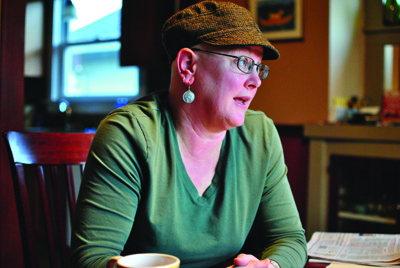
Tags:



























